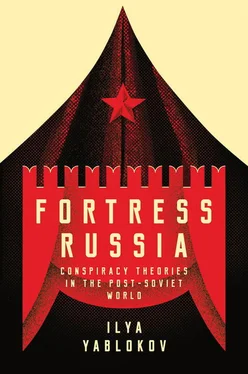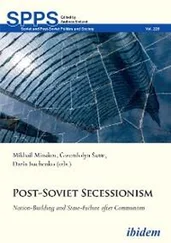All the same, Dugin is very receptive to changes in the political sphere and successfully engages with mainstream political discourse. This is especially evident at times of tension between Russia and the USA. During the Russo-Georgian war in 2008, Dugin was among the first public intellectuals to claim that Ossetians had become victims of ‘the Georgian genocide’ in which allegedly the USA was involved (Ganapol’skii and Dugin, 2008). In fact, accusations of genocide were first made by the Ossetian political elite (Marzoeva, 2008). A few days later, they were reiterated by then President Medvedev, who hinted at the West’s possible interest in the conflict (Simonyan and Medvedev, 2008). Dugin’s involvement could be seen as an attempt to give a high media profile to an extremely controversial allegation, which the Kremlin was ready to use in its official discourse because it legitimized its invasion of Georgia.
Dugin’s Foundations was seen as a highly influential academic work, but in fact it sought to erect a scientific-sounding framework for an anti-Western outlook that could explain the collapse of the Soviet Union in 1991. Paradoxically, it achieved this goal largely by adopting US and Western European conspiracy theories. Adapting Western conspiracy theories to the Russian context helped Dugin weave together diverse narratives about the threat to Russia from the West and turn them into mainstream political thought.
Nataliia Narochnitskaia:
Orthodox Russia vs. the Spiritless West
Dugin’s rise as a prominent intellectual with reputedly academic credentials, but whose public career was mainly based on conspiracy mythmaking, was not unique. Nataliia Narochnitskaia occupies a significant place among the pro-Kremlin public intellectuals specializing in a particular interpretation of history for the purpose of nation-building. She often takes part in television discussions on various aspects of Russian history and publishes books and articles concerning the bravery of Russians which, she holds, has saved the world from global catastrophe. Her work deals with both the tragic and glorious moments in Russian history, and emphasizes the disparity between Russia’s heroic past and bleak present (Krotkov, 2007).
Narochnitskaia constantly reminds her readers and viewers about her academic status and her previous successful careers as a diplomat in the 1980s and a Duma deputy in the 2000s. These credentials serve to enhance her public profile and her status as an expert in global politics. Her father was a prominent scholar of diplomatic history in the Soviet era, and she sees him as the source of her academic and political views. Narochnitskaia claims that her father had uncovered possible strategies which the West then took over and used against Russia, and that this knowledge has helped her decipher global politics and, accordingly, protect Russia from the West ( Narochnitskaia.ru, 2007b). She uses her own successful career to add weight to her pronouncements. In 2004, she established Fond istoricheskoi perspektivy ( The Historical Perspective Foundation ), whose official aim is to carry out research projects on Russian history which can be used to promote patriotism. By the end of the 2000s she had acquired the status of expert in Russian history and from 2009–12 was a member of the notorious Presidential Commission to Counter Attempts to Falsify History to the Detriment of Russia’s Interests (Sherlock, 2011).
Narochnitskaia’s argument is that Russia’s past territorial and geopolitical achievements cannot be dismissed today since they form the basis of the country’s greatness. These achievements were not realized by state rulers, but by ordinary Russians who sacrificed their lives in defence of their country. In Narochnitskaia’s view, the Russian nation differs from other countries because of its spiritual life, interethnic tolerance and social justice (Chernov, 2013). Her eulogy to Russian culture is interlaced with comparisons with foreign countries, primarily Europe and the USA, which invariably lag behind Russia in political and spiritual achievements. This, she argues, is why the West is determined to undermine Russia.
In Narochnitskaia’s view a nation state is a gift from God to its people, in order to aid their moral and patriotic development (Chernov, 2013). By contrast, supra-national institutions like the EU and the UN are created by the Freemasonry and seek to achieve global domination by erasing the borders between nations (Narochnitskaia, 2003, p. 252). This is another cross reference to the American conspiracy culture. According to Narochnitskaia, Russians have high moral standards and a sincere tolerance towards people of different cultures and races (Popova, 2007). By contrast, cosmopolitan societies – which, she argues, are under the control of foreign elites – introduce artificial concepts such as political correctness, which do not require citizens to love their own country (Chernov, 2013). The Western type of patriotism, Narochnitskaia argues, is based on the idea that the Motherland is ‘where taxes are low’ ( Politcom.ru, 2007).
Another crucial difference between Russia and the West, according to Narochnitskaia, is the role played by religion. She argues that religion defines national culture, and that Orthodox Christianity forms the basis of Russian identity. It has helped the Russian nation avoid the obsessive pursuit of wealth, which is so central to Western culture, and it has peacefully integrated a range of ethnic and religious groups within one state. However, Narochnitskaia is not completely consistent. On the one hand, she contends that Christianity unites Russia with Europe because the value of human life originates from the word of Jesus (Pozner and Narochnitskaia, 2007); this could form the basis for the pursuit of common goals and mutually beneficial policies. However, she also claims that all the major denominations of West European Christianity hate Russia and desire its destruction. Narochnitskaia sees the Vatican as Russia’s permanent adversary since it has always wanted to colonize Russian territory. There is, she argues, a ‘fifth column of liberals’ linked to the Vatican, who criticize the Russian Church in an attempt to undermine what she sees as the foundation of the Russian nation (2002). Hence, she links this to the anti-Catholic fears of subversion and of Polish conspiracy which were widely prevalent among Russian conservative thinkers in the aftermath of the Polish uprising of 1863.
Narochnitskaia is equally hostile to Protestantism. She contends that Anglo-Saxon Calvinism has traditionally been indifferent to other nations, regarding them solely as a source of profit. She also alleges that Calvinists were involved in South Africa’s apartheid, British colonialism and the oppression of native Americans in the USA, each of which was rooted in the religious principles of Protestantism (2003, pp. 67–70). She sees US domination of global politics as a hallmark of Calvinist philosophy; this eventually evolved into messianic neo-liberalism, which aimed at restructuring the world into a single atheistic country (2003, pp. 80–3).
Narochnitskaia’s philosophy, like Dugin’s, includes elements of anti-globalist conspiracy theory, with the building of the New World Order the ultimate goal of the conspirators. Influenced, perhaps, by her father’s work, Narochnitskaia adapts Soviet anti-Western propaganda to current conspiracy thinking. For example, she divides the world into ordinary people and the small but powerful group of Western countries that calls itself the ‘world community’ ( mirovoe soobshchestvo ), whose elites, whom she calls the ‘world elite’ ( mirovaia elita ), are supposedly bent on controlling the world (Narochnitskaia, 2001).
Читать дальше
Конец ознакомительного отрывка
Купить книгу












